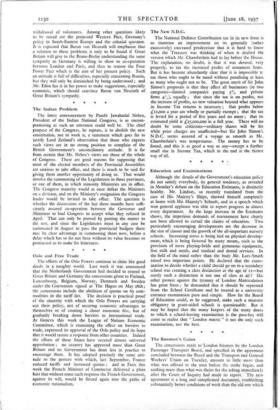Education and Examinations Although the details of the Government's education
policy do not satisfy everybody, its general tendency, as revealed in Monday's debate on the Education Estimates, is distinctly healthy. Mr. Lindsay, so recently translated from the care of His Majesty's Ships, showed himself completely at home with His Majesty's Schools, and in a speech which won general applause was -able to report progress in almost every department. As - the large increase in the Estimates shows, the imperious demands of rearmament have clearly not been allowed to curtail the claims of education. Two particularly encouraging developments are the decrease in the size of classes and the growth of the all-important nursery schools. Increasing stress is being laid on physical develop- ment, which is being fostered by many means, such as the provision of more playing-fields and gymnastic equipment, free milk and meals, and medical and dental services. In the field of the mind rather than the body Mr. Lees-Smith raised two important points. He declared that the exam- ination to decide whether a child should go on to a secondary school was creating a class distinction at the age of tr—but surely such a distinction is not one of class at all ? His other protest against the tyranny of London Matriculation has great force ; he demanded that it should be separated from the School Certificate and be treated as a university entrance examination pure and simple. How far the Board of Education could, as he suggested, make such a measure obligatory in grant-aided schools is questionable. But it may be hoped that the many keepers of the many doors to which a school-leaving examination is the pass-key will come to realise that " London matric " is not the only such examination, nor the best.














































 Previous page
Previous page